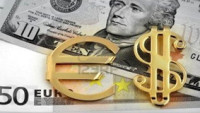 The main surprise overnight was with the cut in rates from the New Zealand central bank, which cut rates by 0.25% to 2.25%. This was not widely anticipated, although their previous statements had indicated that they were ready to cut rates if warranted. The justification was the weakening in the global picture and they also mentioned the exchange rate, which they noted was 4% higher vs. December “and a decline would be appropriate given the weakness in export prices”. Only two of the seventeen economists surveyed by Bloomberg were anticipating a move, hence the sharp fall in the kiwi, with the RBNZ’s statement on the currency also adding to the downward pressure. This came after the Bank of Canada kept rates on hold yesterday, with a statement not as dovish as expected, leading to a further fall in USDCAD, down to levels last seen mid-November.
The main surprise overnight was with the cut in rates from the New Zealand central bank, which cut rates by 0.25% to 2.25%. This was not widely anticipated, although their previous statements had indicated that they were ready to cut rates if warranted. The justification was the weakening in the global picture and they also mentioned the exchange rate, which they noted was 4% higher vs. December “and a decline would be appropriate given the weakness in export prices”. Only two of the seventeen economists surveyed by Bloomberg were anticipating a move, hence the sharp fall in the kiwi, with the RBNZ’s statement on the currency also adding to the downward pressure. This came after the Bank of Canada kept rates on hold yesterday, with a statement not as dovish as expected, leading to a further fall in USDCAD, down to levels last seen mid-November.
If that wasn’t enough central bank action for the week, then we have the much anticipated ECB meeting today. The run-up to this meeting, where further policy action is anticipated, has been very different to the last meeting where more easing was expected back in December. Rightly so, the market have moved away from the simple relationship that further easing (of whatever form) is bad for the currency. As the measures become more unconventional and bond yields ever lower, then it’s not surprising that the way the currency behaves is also changing. It’s not clear that negative interest rates have been effective either on the economy or in pushing the currency lower, which is one of secondary impacts that central banks are hoping for, even if not explicitly. Around 40% of the funds banks deposit at the ECB are remunerated at the negative rate. It could be that the ECB adjusts this to a tiered system, along the lines seen by the Bank of Japan back in January. There is also scope for them to extend the period and also increase the amount of month asset purchases from the current EUR 60bln per month. To go any further, they would likely have to expand the assets available for purchase under the scheme. The bottom line is that the ECB are clutching at fast disappearing straws in terms of finding effective ways to boost the Eurozone economy and reduce the risk of deflation.
Source: Simon Smith, Chief Economist FxPro.
Other useful information for traders:
- Forex Forecasts & Analysis
- Forex Brokers Reviews
- Rating Forex Brokers
- Plus500 Reviews













